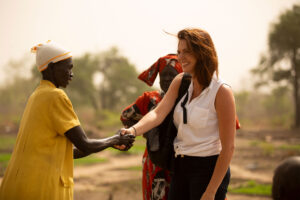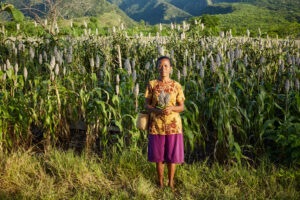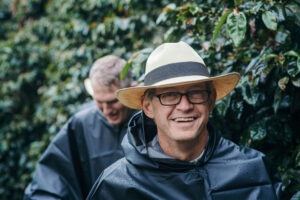
Obakki – A Purpose-Led Lifestyle Brand and Foundation
Founder Treana Peake, supports artisan partnerships and funds development work through the Obakki Foundation.
Global
Grace Robinson January 21, 2021
Growing up in the rainforests of Papua New Guinea, Executive Director of Coalition for Rainforest Nations Kevin Conrad discovered his passion for protecting and sustaining our rainforests alongside his family of Indigenous communities. He left his one-room schoolhouse in the rainforests and studied at Columbia University, London Business School, and University of Southern California. Conrad’s experiences exploring rainforests and deforestation led him to seek a career where he could bring solutions to the precarious relationship humans have with our Earth. Working with the United Nations Framework Convention on Climate Change, Conrad launched numerous efforts to help with deforestation and climate change.
Later, Kevin Conrad helped create Coalition for Rainforest Nations in 2005 in a quest to unite and sustain global rainforests, ensuring the protection of indigenous and rural communities.
The REDD+ Mechanism was established through the coalition to reduce the emissions of greenhouse gases stemming from tropical deforestation, and has allowed for 8.6 billion tons of carbon reductions and removals. With a goal to slow global deforestation by half over the next ten years, Conrad’s quest is inspirational in recognizing the importance of rainforests and their impact on humanity.
Mood of Living: Where did you grow up?
Kevin Conrad: Deep in the rainforest on the north coast of Papua New Guinea along the mighty Sepik River.
MoL: Where did you go to school? What did you study?
KC: My education started in a one-room school where the teacher wrote the lessons for each grade on a chalk board. Once done with the daily assignments, we were free to leave. On average, I left school by late morning and spent the remainder of the day exploring the rainforests around me. Next came high school at a boarding school in the highlands, followed by the University of Southern California, the University of London and Columbia University.
MoL: What was your first job and did it relate to what you studied in school?
KC: My first job was filling potholes with gravel from the creek hauled in my red wagon. Seems my time now is spent trying to fill the potholes on our economic models caused by ignoring environmental “externalities”.
MoL: Where did you find a passion for sustainability and biodiversity? What brought you to work with the Coalition for Rainforest Nations?
KC: Given my upbringing, I felt obligated to leverage my education and opportunity toward sustainable options for the indigenous communities that are my family. It became clear early however, that humanity’s currently precarious relationship with our earth required solutions on a global scale. Understanding I needed to harness my passions and experiences, uniting all rainforests globally in a quest toward sustainable livelihoods gave rise to my founding the Coalition for Rainforest Nations along with Sir Michael Somare, then the Prime Minister of Papua New Guinea, and Roberto Arias, then the President of Costa Rica.
MoL: What is the Rainforest Coalition and where is the headquarters? Which tropical nations are being helped through its formation? Where is your home base and do you travel to these various international rainforests?
KC: The Coalition for Rainforest Nations is based in New York, a few blocks from the Headquarters of the United Nations. The CfRN works with virtually all developing countries with tropical forests. And yes, pre-COVID, my schedule included regular visits across Africa, Asia-Pacific and the Americas.
MoL: In what ways are rainforests and their communities affected by our current climate and industrial development?
KC: It’s not easy to destroy a rainforest. But it’s largely caused by demand for tropical woods and agricultural products grown on the deforested land. Currently economic frameworks value forests more dead than alive. Our work is designed to flip that market failure. At the same time, climate change is hitting many of the poorest communities the hardest. Many live near the sea. Others in dry areas. Both are some of the first to feel the impact of rising seas and growing deserts.
MoL: How does the Coalition for Rainforest Nations help tropical communities to manage their rainforests? What other assistance does the organization bring to these communities?
KC: We try to create incentive systems that lead to sustainable outcomes. Around those systems, we help to construct policy frameworks and monitoring systems. In simple terms, our goal is to ensure that indigenous and rural communities benefit more by keeping their rainforests standing rather than allowing others to destroy them. Thus, we established the REDD+ Mechanism under the Paris Agreement that now includes over 90% of global rainforests. Satellites monitor progress. And incentives are paid based on independently reviewed conservation results.
MoL: Do you live a sustainable life outside of your work? If so how?
KC: I do my best, but true sustainability is a relentless quest. My use of solar energy, electric cars, organic food sources, well water, septic tanks, and public transportation is a good start. But if you really begin to analyze the carbon and resource impacts of life around us, starting with the iPhone and MacBook used for this interview, its daunting. Day by day, we are getting better.
MoL: How do you maintain a work-life balance?
KC: It has not been easy on my family or myself, candidly. However, my kids have travelled the world and spent time in rainforests across the globe. And now that they are older, we all work together on environmental causes where we share passions, including endangered species, rainforest conservation and climate change.
MoL: How has COVID-19 impacted your organization?
KC: Given travel has largely been frozen, we have spent time looking for ways to leverage technology. We have found some success around analysis using satellite imagery. However, the policy development is harder over rickety Internet and cellular networks in many of our countries. Thankfully, we have great personal networks that can withstand the current logistical constraints.
MoL: What changes do you hope to see to the rainforest communities that you work with in the next ten years?
KC: Our goal is to slow global deforestation in half over the next 10 years. And stop global deforestation and begin reversing it in 20. It won’t be easy, but we know how to do it. Our rainforest communities must transition to sustainable livelihoods. Think of the ‘Beverly Hillbillies’. They were poor rural folks who suddenly found wealth selling fossil fuels in the last century. This century, rainforest communities must be compensated for their rainforests that are pulling that carbon back out of the atmosphere for the benefit of all humanity.
MoL: What gives you hope for the future of our world?
KC: We have the knowledge, technology and capital necessary to transition to a sustainable future. Currently, we only lack the will. Thankfully, that too is a renewable resource. My hope comes from my kids and their friends. They are already so far ahead of where I was at their age when it comes to awareness and sustainable choices.
MoL: What advice can you give to people who want to make a difference in our world?
KC: Begin with your interests and passions. Don’t be afraid to start. Take small steps to begin. Test your ideas. Learn from success and failure. Share the wave. Be persistent. Remember, change takes time.
MoL: How can the average person get involved in the preservation of international rainforests?
KC: We are making it easy. From your phone or computer, you can help rural and Indigenous communities and their governments by funding their success through www.redd.plus. We are measuring their success in tons of carbon as a simple proxy for all the ecosystem services rainforests provide around climate, biodiversity, water, climate, etc. REDD.plus is the first digital platform that allows you to be carbon neutral under the Paris Agreement, also preserving the last great rainforests of the world.
MoL: What advice can you give to emerging young leaders of NGOS?
KC: Focus on impact. Which stakeholders hold the most leverage? Seek solutions that allow them to succeed by doing the right thing.
Photography courtesy of Coalition for Rainforest Nations

Founder Treana Peake, supports artisan partnerships and funds development work through the Obakki Foundation.

Global Greengrants Fund is a charitable foundation that supports grassroot causes to solve environmental harm and social injustice across the globe.

Rainforest Alliance, co-founded by Daniel Katz, is an international non-profit organization that unites organizations, rainforest communities, and farmers to build responsible business practices that will improve the livelihood of our planet.